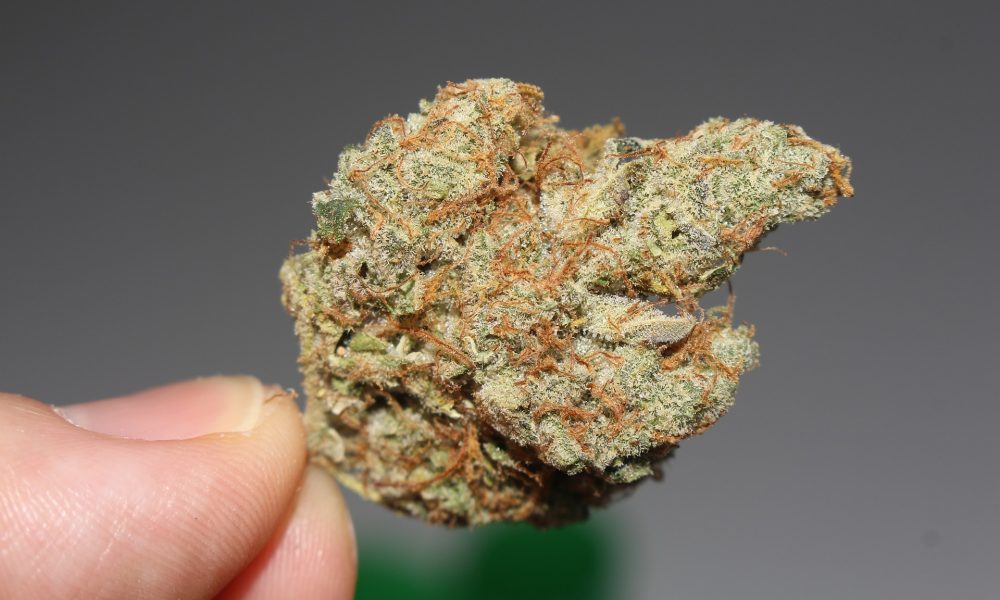The Republican leader of the Kansas Senate is pushing back against an effort to legalize medical marijuana in the state, calling legislation from advocates a “nonstarter” and suggesting the policy change could lead to a surge in “gang activity” and put kids at risk.
Senate President Ty Masterson said in a media interview that while he’s open to enacting a limited cannabis pilot program for patients, he’s heard too much about what’s gone wrong with neighboring Oklahoma’s medical marijuana system to support broader reform.
“You’ve seen the disaster in Oklahoma, right? With cash transactions for land,” he told reporters. “You’re seeing a lot of gang activity there.”
Masterson also claimed that an Oklahoma law enforcement official told him that medical marijuana producers there currently churn out more than 50 times the amount needed by patients in the state. “So it’s not being sold as medicine,” the lawmaker said. “I think that harms the conversation.”
“I think what people see when they think of medical, they’re thinking of, you know, palliative care and things like that,” Masterson continued, “which I think there are a majority of people that are in favor of that.”
In fact, a Kansas Speaks poll from last fall found that 67 percent of Kansans, including a majority of members of Masterson’s own party, support legalizing cannabis for all adults 21 and older.
While Masterson said he’s “open to conversations” about some form of limited cannabis access, he says any legislation will need to “protect our children” for him to allow it to pass.
“What I’m open to is, basically, some type of pilot program or something that is controlled to the point you can test it, but you don’t have to— it’s not the horse is out of the barn and you can’t ever put it back in,” he said.
Masterson also acknowledged that despite prohibition, marijuana is already being used in the state, including by underage youth in schools.
“It’s here in Kansas already, and I don’t think that’s helpful to the argument,” he said, pointing to news stories “about growing, large numbers of students having issues, you know, basically overdosing on edibles and things.”
The issue, he said, boils down to “protecting our population.”
The comments were aired on local NBC affiliate KSNT.
The comments echo Masterson’s past skepticism about cannabis. He said last month, for example, that he’s “open” to passing a medical marijuana program—but only a restricted version for seriously ill or terminal patients. And he might want to do a pilot program first before potentially expanding the limited reform.
At the same time, he downplayed popular support for cannabis legalization more generally that was demonstrated in a recent poll, suggesting voters don’t understand the policy change.
“If you look at that question, I think most people would answer yes, but they don’t know what they’re actually saying yes to,” the Senate president said.
As the new legislative session gets underway, advocates in Kansas are ramping up efforts to finally allow patient access to marijuana.
The state’s House of Representatives passed a medical marijuana bill in 2021, but Masterson stalled it in the Senate the next year.
In 2023, the Senate’s Federal and State Affairs Committee held several hearings on a medical cannabis reform bill, but members ultimately voted to table it.
After the Senate committee shelved the medical marijuana bill, Gov. Laura Kelly (D) issued a statement urging the public to contact their representatives to demand that they take the legislation back up for action, but that did not happen before the end of the legislative session.
Kelly, who has long championed cannabis reform, said at the time that she was “disappointed that some legislators are saying they don’t want to move forward with legalizing medical marijuana this year—effectively turning their backs on our veterans and those with chronic pain and seizure disorders.”
A year ago, in her 2023 State of the State address, the governor said that there’s a “commonsense way to improve health care here in Kansas—and that’s to finally legalize medical marijuana.”
The governor also said in 2021 that she would be “enlisting the efforts of the people of Kansas who really want this” to pressure their lawmakers to get the reform enacted.
Members of the state’s Special Committee on Medical Marijuana held final meetings on the issue in December 2022, as they worked to prepare legislation for the 2023 session. Sen. Rob Olson (R), who chaired the special panel, said that he believed Masterson removed him as chair of the Federal and State Affairs Committee in retaliation for holding the medical marijuana hearings.
Also in 2022, then-House Minority Leader Tom Sawyer (D) and Assistant Minority Leader Jason Probst (D) said they wanted to let voters decide on legalizing medical and adult-use marijuana in the state.
The governor, for her part, previously pushed a separate proposal that would legalize medical cannabis and use the resulting revenue to support Medicaid expansion, with Rep. Brandon Woodard (D) filing the measure on the governor’s behalf.
Following President Joe Biden’s announcement in 2022 on pardoning people who’ve committed federal marijuana possession offenses and imploring governors to follow suit, Kelly said that her administration is “focused on legalizing medical marijuana so that Kansans with severe illnesses no longer have to suffer.
Kelly added that they will “continue to consider all clemency and pardon requests based on a complete and thorough review of the individual cases.”
The governor also said in 2020 that while she wouldn’t personally advocate for adult-use legalization, she wouldn’t rule out signing the reform into law if a reform bill arrived on her desk.
Senators Tell DEA To Fully Legalize Marijuana, Demanding Answers On Rescheduling Process
Read the full article here

